| Srl | Item |
| 1 |
ID:
137223


|
|
|
|
|
| Summary/Abstract |
South Korea and Japan have experienced their worst deterioration of bilateral relations since 2012. What are the long-term prospects for this relationship? Will it continue on this negative trajectory or recover positively in the long term? Challenging the conventional view that supports the former conclusion, this paper argues for a positive outlook for the relationship in the long term. This is defended from a structural perspective relying on two long-term strategic trends for Northeast/ East Asia—the elevated uncertainty in the regional environment (due to North Korea and China’s strategic rise); and the rising strain on the U.S. military presence in both countries. In response to these structural pressures, South Korea and Japan will adapt and adopt strategies to defend their national security within a reformed U.S. alliance structure and strengthen strategic cooperation through bilateral and trilateral (with the United States) means.
|
|
|
|
|
|
|
|
|
|
|
|
|
|
|
|
| 2 |
ID:
099688
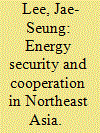

|
|
|
|
|
| Publication |
2010.
|
| Summary/Abstract |
The importance of Northeast Asian energy cooperation has been consistently emphasized in recent years to cope with uncertainties in the global energy market and to avert potential conflicts regarding energy supply among consumer countries. Energy supply, climate change, and the North Korean energy crisis have posed major concerns with respect to the energy security of Northeast Asian countries. However, the actual implementation of energy cooperation has reflected strong competition among major energy consuming countries, despite the perceived necessity of energy cooperation. Energy cooperation in Northeast Asia has become essential-not only for the facilitation of energy supply but also for the prevention of potential conflicts stemming from competitive energy procurement. This paper proposes that intergovernmental energy cooperation in Northeast Asia should focus more on the aspect of public goods. Intergovernmental energy cooperation should be based on a practical and achievable "soft agenda" rather than a "hard agenda" of large-scale supply projects. Successful energy cooperation in Northeast Asia needs a careful reconsideration of the agenda-setting and the modality of cooperation in terms of scope, membership, and issue linkage. The case for regional energy cooperation could be guaranteed if participating countries were to move together toward a virtuous circle of energy cooperation out of neo-mercantilist competition. Confidence-building measures to ease the escalation of conflicts regarding energy supply may also be an important basis for further energy cooperation.
|
|
|
|
|
|
|
|
|
|
|
|
|
|
|
|
| 3 |
ID:
101628
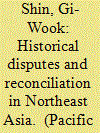

|
|
|
|
|
| Publication |
2010.
|
| Summary/Abstract |
Unhealed wounds from past wrongs, committed during colonialism and war, have created regional animosity and stunted reconciliation in Northeast Asia. Claiming that continued disputes over historical injustice are not solely an intra-Asian issue, this article explores how the US can facilitate historical reconciliation in the region. It is necessary to recognize that the US played a significant role in dealing with historical issues in the aftermath of World War II. Aside from failing to fully address Japanese war crimes in the Tokyo Tribunal, the US was also pivotal in setting the terms of the San Francisco Peace Treaty, a legal instrument that has been the historical precedent for expunging any sense of Japanese guilt and responsibility. Likewise, the US has yet to formally accept its own actions which could be perceived as "crimes against humanity": the US atomic and carpet-bombing of Japanese cities. This article advocates a self-critical, self-reflective approach that would involve US acknowledgement of its own responsibility in handling or mishandling of history issues in Northeast Asia. More specifically, the article also evaluates recent proposals for a presidential visit to Hiroshima or Nagasaki as a means of recognizing the human suffering caused by the atomic bombing, and for a new interpretation of the San Francisco Peace Treaty to better enable victims of Japanese war crimes to air grievances. This article supports both proposals but also argues that they must be implemented with caution and within a larger regional historical framework rather than as an attempt to bolster solely US-Japanese relations.
|
|
|
|
|
|
|
|
|
|
|
|
|
|
|
|
| 4 |
ID:
124850


|
|
|
|
|
| Publication |
2013.
|
| Summary/Abstract |
This article investigates the possibility presented by De Geer (2012) that radionuclides detected at stations in South Korea, Japan, and Russia in May 2010 were evidence that North Korea conducted at least one unannounced low yield nuclear test on 11 May. It provides HYSPLIT (Hybrid Single Particle Lagrangian Integrated Trajectory Model) atmospheric transport modeling of the observed radionuclides assuming candidate origins in North Korea, ROK, Japan, Russia, mainland China, and Taiwan. Xenon activity calculations for reactor- and explosion-produced isotopes are used to ascertain possible release ratios and source terms. The HYSPLIT modeling finds that the most likely origin of the radionuclides is close to the site of North Korea's declared nuclear tests in 2006 and 2009. The activity calculations show that the source term is consistent with a nuclear test up to a few hundred tons yield. These results are discussed in the context of a decoupled but uncontained nuclear test by North Korea on 11 May 2010. If the scenario suggested by De Geer and supported here is correct, it seems that there is a significant possibility of detecting even a small, decoupled nuclear test in North East Asia using components of the International Monitoring System of the Comprehensive Test Ban Treaty.
|
|
|
|
|
|
|
|
|
|
|
|
|
|
|
|
| 5 |
ID:
099073
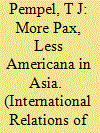

|
|
|
|
|
| Publication |
2010.
|
| Summary/Abstract |
Northeast Asia presents a major theoretical puzzle: the region is rife with security challenges and seems continually poised for horrific military conflicts. Yet, despite many structural tensions, the region has been devoid of significant shooting wars since the signing of the Korean armistice in 1953. This essay examines two major contributions to that pacific condition: first, the pervasive focus on economic development and the growing economic links across the region; and second, the growing number of multilateral institutions within the Asia-Pacific. It concludes that while a 'Pax Americana' was important to peace in the past, the long-term prospects are for the continued absence of overt conflict but in ways that will reflect an overall decline in America's capacity to shape regional developments.
|
|
|
|
|
|
|
|
|
|
|
|
|
|
|
|
| 6 |
ID:
082234
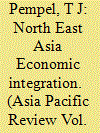

|
|
|
| 7 |
ID:
064573


|
|
|
| 8 |
ID:
009222
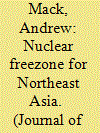

|
|
|
|
|
| Publication |
Summer/Fall 1995.
|
| Description |
288-321
|
|
|
|
|
|
|
|
|
|
|
|
|
|
|
|
| 9 |
ID:
009667


|
|
|
|
|
| Publication |
Jan 1996.
|
| Description |
1317-1328
|
|
|
|
|
|
|
|
|
|
|
|
|
|
|
|
| 10 |
ID:
098096


|
|
|
|
|
| Publication |
2010.
|
| Summary/Abstract |
A review of four periods and a comparison of three regional institutions provide evidence for how serious China has become about multilateralism with its neighbors in Asia. Approval for multilateralism does not mean that China is ready to endorse strong regional organizations that bind their members, especially when it has reservations both about institutions that could undermine its narrow notion of sovereignty and norms that could support US or even Japanese efforts to impose long-feared universal values. If China calculates that limited multilateralism now provides a variety of benefits, to date its support reflects specific circumstances, not general trust in this format. Focusing on the Six-Party Talks as the presumed foundation for regionalism in Northeast Asia offers a concentrated view of strategic thinking toward the area most vital to China's security. In the standoff between North Korea and the United States we are able to assess the degree to which China accepts working with four or five states and the prospects for its active support, if circumstances permit, for the establishment of a peace and security mechanism through the fifth working group that originated in the Joint Agreement of February 2007.
|
|
|
|
|
|
|
|
|
|
|
|
|
|
|
|
| 11 |
ID:
084770


|
|
|
| 12 |
ID:
066931
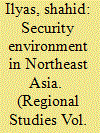

|
|
|
| 13 |
ID:
128480
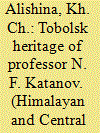

|
|
|
|
|
| Publication |
2013.
|
| Summary/Abstract |
Scholars of the Tyumen region systematically refer to the scientific heritage of unique scholar-Turcologist Nickolay Fyodorovich Katanov. After his successful graduation from oriental department of Saint Petersburg University in 1889, N. F. Katanov was sent to a long field trip by the Imperial Russian Geographic Society and Petersburg Academy of Science ' to Siberia, Northern Mongolia, Dzungaria and Chinese Turkestan. Here n he studied customs, household activities, language and folklore of the local Turkic peoples besides collecting, processing and preparing huge material for publication. Outstanding orientalist N. F. Katanov enriched indigenous Turcology with extraordinary scientific works concerning the Siberian Tatars. Katanov carried out labour-intensive work in defining and systematizing all proper names that led to the release of two-volume alphabetical index of names which appear in Folk literature samples of the Turkic tribes of V. V.
Radloff. The lion's share of these materials is data on onomastics of the Siberian Tatars.
|
|
|
|
|
|
|
|
|
|
|
|
|
|
|
|
| 14 |
ID:
095709


|
|
|